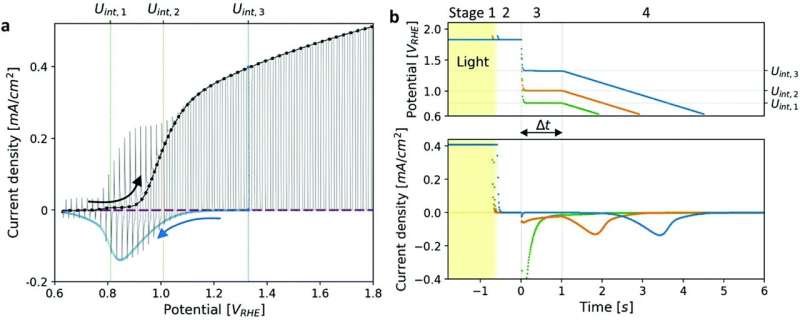
Splitting water to produce green hydrogen fuel has two drawbacks right now: It is both time and energy intensive. Ben-Gurion University of the Negev environmental physicist Prof. Arik Yochelis and Technion—Israel Institute of Technology material scientist Prof. Avner Rothschild took a different tack and believe they have identified new pathways that would speed up the catalytic process that is expected to reduce the invested electrical energy costs significantly.
Water splitting process that is aided by solar energy (i.e., photoelectrochemistry) lowers the amount of the invested electrical energy needed to break the chemical bonds in the water molecule to generate hydrogen and oxygen.
Oxygen evolution requires transfer of four electrons to create one oxygen molecule (O2) and two hydrogen molecules (H2). According to the current paradigm, those electrons move one after the other in a sequence of four steps on an atomic reaction site, which makes the chemical reaction energetically difficult.
However, Profs. Yochelis and Rothschild showed both theoretically and experimentally a new paradigm according to which two electrons can simultaneously be transferred at different reaction sites, reducing the energy barriers for oxygen evolution.
They were originally troubled by experiments that did not fit the existing paradigm and so set out to find a different rationale.
Their findings were published in Energy & Environmental Science.
“Our research changes the common understanding within the scientific community regarding the catalytic mechanism for oxygen evolution, a central and important reaction that represents a bottleneck in producing hydrogen from water. By combining knowledge and experience from two different fields, we showed that the catalytic reaction is more complicated than people think.”
“Hopefully, this new understanding will lead to additional breakthroughs in materials development and new processes to create clean fuels from renewable resources in order to facilitate the transition to net-zero,” says Prof. Rothschild.
“Over and above the scientific contribution of the research, it is important to emphasize the importance of the multidisciplinary approach and collaborations when dealing with complex systems, like the energy system. Without open-minded and constructive communication between two researchers with different approaches, this would not have happened. It is a lesson to all of us, frank collaboration will always yield creative solutions to challenging problems,” Prof. Yochelis adds.